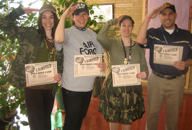 Before moving to Austin, I had the pleasure of working with a team of teachers in the Bethlehem Area School District in eastern Pennsylvania that knocked my socks off. At the time, I was a Middle School Math Coach who spent time co-teaching with this amazing team of teachers on a daily basis (what a blessing!)
Before moving to Austin, I had the pleasure of working with a team of teachers in the Bethlehem Area School District in eastern Pennsylvania that knocked my socks off. At the time, I was a Middle School Math Coach who spent time co-teaching with this amazing team of teachers on a daily basis (what a blessing!)
During the spring of 2011, we decided to conduct a “PSSA BOOT CAMP” with the 40-some students on the “team” (yes, this was before deep budget cuts that obliterated the middle school teaming model). Our “boot camp” consisted of four teachers, each of whom represented a branch of the military, and roughly ten students per military branch (so each teacher closely monitored ten-ish students). We dressed the part (see photo above) and really hammed it up, referencing students as “cadets” and ourselves as “Sergeants” – and those 7th graders ATE IT UP. Boot camp lasted for 5 days, and was structured as follows each day (one 45-minute class period per day):
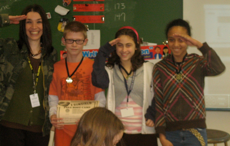
* A physical warm-up (think push-ups or jumping jacks, done to a military tune)
* A “mission” (a test-taking strategy) which we modeled, both “effective” applications, and “ineffective” somewhat humorous non-examples
* Time to do a brief problem set to immediately apply the day’s “mission” (I believe we set a timer for 7 minutes, and monitored our 10 cadets closely)
* Accountability that the mission was accomplished (gathering student work samples to anonymously display to the class via doc cam for discussion)
At the week’s end, we had an awards ceremony, where every student was presented with a certificate. During the final week before testing, we focused on test-taking strategies and novelty, and hoped that our “missions” would stick!
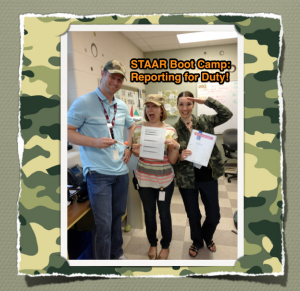
Fast-forward to this past week – I’m teaching in Austin now at Hill Country Middle School, and have the pleasure of working with yet ANOTHER fabulous team of teachers who embraced the “boot camp” idea to prepare 8th graders for STAAR testing. It is so fun to work with students and staff who are willing to embrace a little role-play and fun! Our daily agenda has included an objective and a “mission” (strategy). Since every student has an iPad, we’ve conducted live-data daily homework spot-checks using Socrative as well as individual quizzes using Thatquiz.org. We used a TAKS Prep workbook as our resource for practice problems. Our daily agenda has been:
Objective 1: Numbers & Operations problem set (only had half the period to explain that we were beginning “STAAR Boot Camp” so Day 1 was cut short with no test-taking strategy “mission”. We did, however, play loud military music, wear camo, and march while distributing the TAKS workbooks to set the tone!)
Objective 2: Algebraic Reasoning problem set; Mission “Scrap Paper”
Objective 3: Geometry problem set; Mission “Multiple Choice”
Objective 4: Measurement problem set; Mission “STAAR Chart”
Objective 5: Probability & Statistics problem set; Mission “Key Words”
Objective 6: Math Processes problem set; Mission “Griddables”
Every day started with a Socrative Teacher-Paced (formative) homework quiz. I would call out a specific problem number, and students sent me their answer choice for the multiple-choice problem at hand. I connected my iPad to the projector and kept the “live results” bar graph hidden from view until all students had weighed in. When I displayed the live results, we crossed our fingers and hoped for that beautiful picture of a unanimous, tall bar above the correct answer choice! Sometimes we got it… other times, we cringed at the sight of a bar graph nearly evenly split between all four answer choices. This instant data provided great discussion and brief-reteaching opportunities.
Next came the day’s objective and mission. We’d ask students each day to first provide examples of the day’s mission, such as multiple choice test-taking strategies, effective uses of scrap paper, defining variables on the STAAR reference chart, and identifying key words in problem statements. Each of the three of us teachers would then chime in with additional tips and examples of the day’s mission.
 Then, a problem set was assigned to the class. Students were given 5 minutes to work silently and individually, then 5 minutes to continue working with a partner. Students were also expected to apply the day’s mission specifically as they worked. After 10 minutes, we brought the class back together and used the Random Name Selector app to select “random reporters” to share problem solutions.
Then, a problem set was assigned to the class. Students were given 5 minutes to work silently and individually, then 5 minutes to continue working with a partner. Students were also expected to apply the day’s mission specifically as they worked. After 10 minutes, we brought the class back together and used the Random Name Selector app to select “random reporters” to share problem solutions.
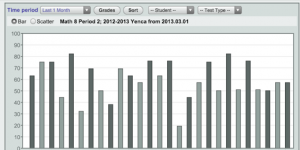
To hold students individually accountable throughout the week, I created brief quizzes using Thatquiz.org. Every other day, students had a quiz on two objectives (objectives 1 and 2 served as a quiz, objectives 3 and 4 served as the next quiz, and so on).
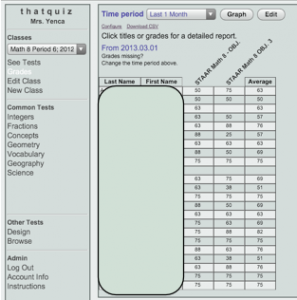
As students quizzed individually, we teachers watched their live quiz scores from the teacher login side of thatquiz. We could click on student scores and see which problems they were missing. After all students completed the quiz, we were able to briefly address the mistakes we observed behind the scenes on Thatquiz. Careless errors in arithmetic and reading comprehension were repeat offenders!
The iPad was a tremendous help during Boot Camp! While we didn’t always like the data we saw… its real-time-ness helped us address concerns and guide our students very specifically and intentionally. We’re hopeful that the errors that happened during “camp” help students be more careful during STAAR testing next week!

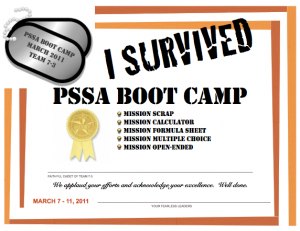















Pingback: What is a “Math Coach”? | MathyCathy's Blog – Mrs. Cathy Yenca